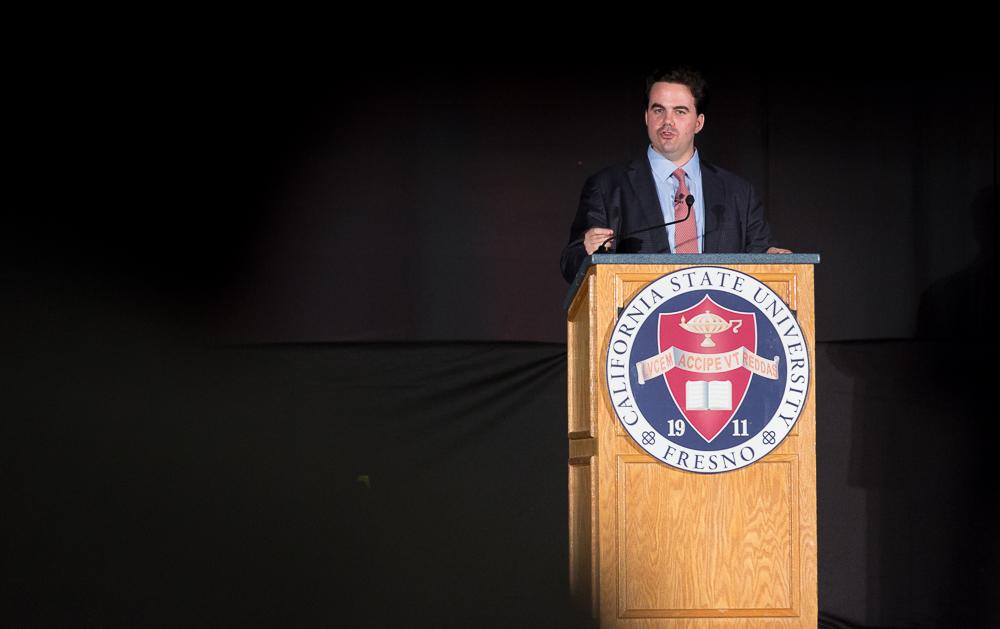It is too early to tell if the Donald Trump administration is a successful one, according to Washington Post reporter Robert Costa, who spoke at Fresno State on Monday as part of the President’s Lecture Series.
The event was held at the Save Mart Center. Costa said one thing is clear from the Trump administration — it has struggled to enact its key agenda items.
The talk, entitled “Inside Trump’s Washington: The Rise and Stall of an Outsider President,” focused on the “up-close” view Costa has had during his time reporting on Donald Trump since 2013. All the way to his rise to the presidency and the the current stall he faces in Washington.
Costa, taking questions from reporters before his speech, said Trump came into Washington as an outsider.
“I remember speaking with him during the transition where he really didn’t have the relationships within his own party, the Republican Party, that he probably needed at the start to get things done,” he said.
Costa provided a timeline of how the current administration came to be and how those in the White House will move forward. Costa said the president has turned to using his executive power much like former President Barack Obama.
“What I’m covering right now in Washington is a president who’s trying to navigate his own bases — a party that doesn’t really like him, the Democrats who are of course wary of him, to try to get something done,” Costa said.
Costa through his speech also showcased a calendar of private plane rides, early-morning phone calls and face-to-face interaction with supporters of the presidential candidate.
Trump’s online and public demeanor is also something that does not shock Costa. The journalist said the president has always been that way.
“He knows his base loves that kind of behavior because they see it as authentic — an authentic outsider,” Costa said. “Other people recoil at the president’s behavior and say it’s out of line and unpresidential but his base loves it. This is a president who is driven by his base.”
Costa also discussed the relationship between the press and the Trump administration.
“I think it’s important for the press not to be the story,” he said. “This administration sometimes wants to make the press a target. It’s important as reporters for us to resist being baited into a political back and forth with any politician, whether it’s a Democrat or a Republican.”
Costa also said news media needs to do a better job of listening to its audience. He said he loves traveling as a reporter because it gives him the opportunity to meet people around the country to hear their concerns as a reporter.
Costa said his job is to report political stories, not become involved in the “political game.”
“I try to resist getting political at all because it’s the role of us to put up a mirror of power,” he said. “To reveal power day in and day out in the political way. We fight for the truth. We fight for fact. We fight for news stories and information.”
As for “fake news,” Costa said it exists, but there’s confusion on what is fake news and what is incorrect criticism.
“Fake news is when people make things up, and they publish fake material,” he said. “It’s different when a political critic calls a story they don’t like fake. There’s fiction and then there’s people calling stories fake because they don’t like it.”
Costa said he welcomed criticism from readers and critics because it helps the media do a better job, but the critique should be done fairly and not politically driven.
“It’s our burden to get through the noise to try to provide people with actual stories,” he said. “Try to provide people with good information.”
He said President Trump is different from almost every president the country has ever had, but that doesn’t change how journalists should do their work.
David Vargas, a sophomore from the media communications, and journalism department, found out about the event online and decided to attend to gain perspective on his field. He wants to become a political journalist too.
“Having someone here on campus that has gone that route has that knowledge, especially now with the presidency, I found it really interesting,” he said.
The most helpful advice Costa gave, according to Vargas, was to always remember the purpose of journalism.
“It’s not a matter of just defending your credibility. You just have to go out there and do your job. I found that helpful because there’s not a lot of journalists that state that,” Vargas said.
Vargas said he wanted to ask Costa about Deferred Action for Childhood Arrivals, (DACA), but he was unable to be heard due to time restrictions.
“I would have asked him, what does he think President Trump’s true opinions on DACA are,” he said.
Costa shared his email with the audience for those who had questions but couldn’t ask them. Vargas will be emailing him the question to stay in touch.
Costa, who spent a few days in Fresno prior to Monday’s talk, said Fresno is “a special community.”
“It’s been really great to know Dr. Castro and to see how the Central Valley is adjusting, as all of America is adjusting, to these changing times we’re living in, [and] what it means for people living here and to hear their perspective has been really great,” Costa said.
Castro said the university was lucky to have a speaker like Costa visiting. It helps “demystify” what is happening in Washington, D.C., he said.
“That will help our students, faculty, staff and alumni community better understand the forces at play today and what to expect in the future,” Castro said.




